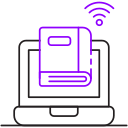In today’s rapidly evolving technological landscape, navigating the digital age requires more than simply using devices or accessing the internet. Digital literacy has emerged as an essential set of skills, encompassing the ability to critically evaluate, responsibly use, and creatively engage with digital tools and content. Mastery in digital literacy empowers individuals to communicate effectively, protect themselves online, and leverage digital resources for personal and professional growth. This web page explores the key components of digital literacy, providing a comprehensive understanding necessary for thriving in an increasingly interconnected world.

Basic computer proficiency forms the cornerstone of digital literacy. It involves the ability to operate common hardware, such as desktops, laptops, and mobile devices, as well as familiarity with standard operating systems like Windows, macOS, or Linux. Proficiency also extends to using peripherals—such as printers or scanners—and understanding the organization of files and folders. With this foundational knowledge, individuals can access resources, manage information, and troubleshoot simple technical issues independently. These skills not only foster self-reliance but also create opportunities for further exploration and growth in digital environments.

The internet serves as the gateway to a world of information, communication, and services. Navigating the internet involves more than knowing how to browse websites; it requires the capability to evaluate sources, search effectively, and understand the structure of digital networks. This block highlights the importance of being able to distinguish reliable information from misinformation, recognizing secure websites, and understanding how data is exchanged online. Mastery in internet navigation equips individuals to make informed decisions, connect safely with others, and harness the vast resources available at their fingertips.

As technology advances at an unprecedented rate, the ability to adapt to new software, devices, and platforms becomes an integral part of digital literacy. This block underscores the value in cultivating a mindset of continuous learning, as well as practical strategies for staying abreast of emerging technologies. Individuals who are open to experimentation and comfortable with change are better positioned to take advantage of digital innovations. Adaptability empowers people to remain competitive in the workforce and resilient in the face of technological disruption.
Ensuring Online Safety and Security
01
The digital landscape presents numerous opportunities for sharing personal information, but doing so without caution can have serious consequences. Protecting personal information involves understanding what types of data are sensitive, how to manage privacy settings on various platforms, and recognizing when it is appropriate to share certain details. This knowledge extends to creating strong, unique passwords and being vigilant about the permissions granted to apps and websites. By prioritizing privacy, individuals can minimize risks such as identity theft, unauthorised data access, and financial loss, ensuring greater confidence when interacting online.
02
Online threats come in many forms, from phishing scams and viruses to more sophisticated cyber attacks. Developing the ability to identify warning signs—such as suspicious emails, unusual website behavior, or unsolicited requests for information—is crucial. Proactive awareness allows individuals to avoid falling victim to malicious activities and understand how to report or respond if a threat materializes. Recognizing these threats calls for consistent education and remains a vital aspect of maintaining digital well-being for both individuals and organizations alike.
03
Being a responsible digital citizen goes beyond self-protection; it encompasses the collective responsibility to contribute positively to the digital community. This involves understanding the importance of honesty, respect, and ethical behavior in online interactions. Adopting respectful communication, avoiding the spread of misinformation, and supporting inclusive online spaces contribute to a safe and welcoming internet for all. By modeling good digital citizenship, individuals help foster trust and cooperation in their digital networks, promoting a healthier, more productive environment.
Developing Critical Evaluation Skills
The internet is a vast source of information, but not all of it is trustworthy. Assessing information credibility involves looking at the authority and expertise of the source, checking for bias or ulterior motives, and corroborating facts with reputable references. It also means being aware of the date of publication and understanding the context in which information is presented. By honing the ability to critically assess sources, individuals can avoid falling for hoaxes and make judgments based on accurate, up-to-date knowledge.
